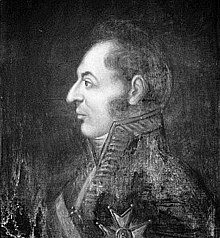Pedro Ceballos Guerra
Pedro Ceballos Guerra ( in a different spelling also: Cevallos ) (* 1759 in San Felices de Buelna , Cantabria , Spain ; † May 29, 1839 in Seville , Spain), was a Spanish diplomat and politician who lived under the kings Charles IV and Ferdinand VII was Prime Minister of his country.
Youth and education
Ceballos was born in Cantabria as the son of a noble family . His parents were Francisco Javier de Ceballos, Señor de Rioseco , and Margarita Guerra de la Vega. He studied law at the University of Valladolid and obtained his doctorate .
Diplomatic service
He entered the diplomatic service under the government of Prime Minister José Moñino y Redondo , Count Floridablanca . From 1792 he worked as a legation secretary at the Spanish embassy in Lisbon .
He married a niece of Manuel de Godoy . Their daughter Josefa married Luis Ramón Aguila Alvarado, marqués de Espeja .
Career in civil service, term of office as Prime Minister under Charles IV.
After his station in Lisbon, he received a position as finance advisor at the court of Charles IV under the Godoy government. In 1800 he was supposed to go to the Bourbon royal court of Naples as ambassador , but he never took up this post.
After Godoy's official overthrow as Prime Minister, Ceballo followed him into office after brief terms in office from Francisco Saavedra de Sangronis and Mariano de Urquijo y Muga . Formally, Ceballos was the head of government, but the most significant influence on Spanish politics was retained by Generalissimo Godoy throughout his tenure .
1802 he was in the order of Charles III. recorded.
The first term of office was dominated by the influence of Napoleon Bonaparte , who included Spain as an ally in his war against Portugal and Great Britain . The wars of Napoleon cost Spain dearly, the defeat at the Battle of Trafalgar in 1805 was one of the victims Spain made.
Resistance to Napoleon
In 1808, French troops occupied Spain on the pretext of wanting to march through to Portugal. The population rose up against Godoy's concessions: The mutiny of Aranjuez in March 1808 led to Godoy's resignation and the abdication of Charles IV. This ended Ceballos' term as prime minister.
Napoleon had Madrid occupied, the new king-designate Ferdinand VII established in France and declared his brother Joseph Bonaparte king of Spain. In Bayonne he convened a constituent assembly to pass the statute of Bayona as a constitution and to give Joseph's rule the desired legitimation.
Joseph Bonaparte planned to appoint Ceballos as foreign minister and to have the constitution signed. But Ceballos clearly stood by Ferdinand's side. In several publications he defended his legitimate right to the Spanish throne. Napoleon declared him a traitor to the Spanish and French crowns in November 1808.
exile
Ceballos fled to London, where he bought a printing company in January 1809 and continued to support the Spanish resistance against Napoleon from there. After the defeat of the Bonapartists, he was elected as a representative in the Cortes of Cádiz in 1813 .
Term of office under Ferdinand VII.
With the return of King Ferdinand to the Spanish throne, Ceballos was reappointed Prime Minister in November 1814. His term of office lasted until October 1816. As Prime Minister he was accepted into the Order of the Golden Fleece .
In 1816 he went to Naples as Spanish ambassador and from 1818 to 1820 to Vienna to the imperial court.
After Ferdinand's death, the regent Maria Christina offered him a renewed participation in the government, but Ceballos refused, referring to his advanced age. He died in Seville in 1839.
Web links
- Spanish Ministry of Sport and Culture: Ceballos Guerra, Pedro (1759-1839) (personal data, Spanish).
- Editor: Biografía de Pedro Cevallos . in: El Diario Montañés , Santander January 6, 2008 (short biography, Spanish).
| personal data | |
|---|---|
| SURNAME | Ceballos Guerra, Pedro |
| ALTERNATIVE NAMES | Cevallos Guerra, Pedro |
| BRIEF DESCRIPTION | Spanish diplomat, politician and prime minister |
| DATE OF BIRTH | 1759 |
| PLACE OF BIRTH | San Felices de Buelna , Cantabria |
| DATE OF DEATH | May 29, 1839 |
| Place of death | Seville |
